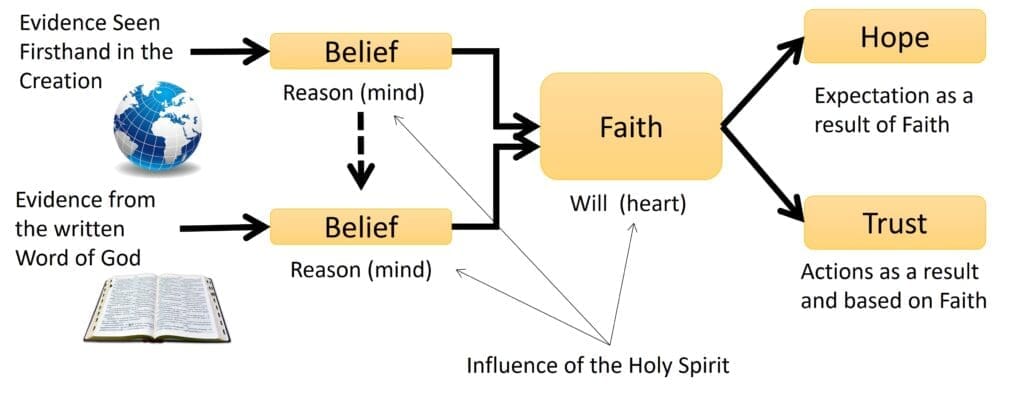Wisdom Wednesday: Wisdom of Faith and Hope
Submitted by Debbie’s Dad
“Now faith is the substance of things hoped for,
the evidence of things not seen.”
({Hebrews 11:1) KJV
The prominent evolutionary biologist and atheist, Richard Dawkins, introduced the misguided concept that faith is belief in something without evidence and reason, and belief even when contradictory evidence exists. He sarcastically noted that this is the definition of a delusion in his book “The God Delusion” (2006). How sad to redefine faith for his own purposes.
Faith in Jesus Christ is indeed based on solid evidence and reason. Evidence is first provided in the creation, which reveals God’s eternal power and divine nature. This evidence can lead us to wisely acknowledge God, or to foolishly reject Him. (Heb. 11:3 below; see also Rom. 1:20-21)
By faith we understand that the worlds were prepared by the word of God, so that what is seen was not made out of things which are visible. Heb 11:3.
Further knowledge of God as a Person is going to provided in Scripture, and the Gospels provide the evidence of Jesus Christ as God’s Son and our Redeemer. Accepting this evidence, reasoning about it, and yielding our heart to accept the Personal God is faith.
But our faith is not just based on a rational belief in the mind; it is the result of yielding the will of our heart to the truth of our sinful state and our need for salvation.
Paul commended Timothy because his learning in the Old Testament Scripture as a boy, gave him wisdom that led to his salvation by trusting in Jesus:
You, however, continue in the things you have learned and become convinced of, knowing from whom you have learned them, and that from childhood you have known the sacred writings which are able to give you the wisdom that leads to salvation through faith which is in Christ Jesus ( Tim 3:14–15).
Our faith is built on the foundation of acknowledgement of the Creator God, and the Scripture that makes us wise to receive Jesus Christs unto salvation. Paul warns us not to build our faith on the wisdom of men, but on the power of God. (I Cor. 2:5)
The passage in Hebrews is not a definition of faith per se, but asserts the benefits of faith:
- Faith is the substance of things hoped for –Faith provides confidence in God’s promises; for the believer, faith makes the future promise of life with Him as if it were a present reality. We walk and live in this life with Him.
- Faith is the evidence of things not seen – Faith enables the believer to see, understand and appreciate spiritual truth. Faith is the evidence [a demonstration] in the life of a believer of one who lives “by faith” (Heb. 10:38; Hab. 2:4; Rom 1:17; Gal 3:11)
As we have seen in our earlier study on the mind and heart, our reasoning in the mind enables us to comprehend and rationally believe, and our heart yields our will to embrace God (in Jesus Christ) by faith. And our faith gives us hope (the expectation of our future with Christ) and enables us to trust (living our lives by taking actions that demonstrate our reliance on Him). We illustrate this in the chart below.

The rest of Hebrews 11 enumerates the faithful saints throughout the ages whose faith in the unseen God gave them great hope and led them to live unswerving lives because of their faith, hope and trust. The writer to the Hebrews commended their wisdom in trusting the unseen God for an unseen eternal future, rather than a near-term solution in their lifetimes:
And all these, having gained approval through their faith, did not receive what was promised, because God had provided something better for us, so that apart from us they would not be made perfect. Heb 11:39–40.
May we also wisely walk in faith, looking to our hope in Christ and trusting in Him as we walk.